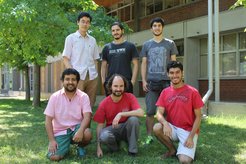"Max Planck Partner Group" in Chile studies the galactic centre
Jorge Cuadra at the Astrophysics Institute of the Universidad Católica de Chile now leads one of the forty 'Max Planck Partner Groups' that exist around the world. The award includes a grant to work on research topics about the centre of our Galaxy.
The research group led by Jorge Cuadra consists of seven researchers at the Astrophysics Institute. In the framework of the "Max Planck Partner Group" this group will collaborate with the team of MPE director Reinhard Genzel, who confirmed the existence of the supermassive black hole at the centre of our galaxy. Its mass has been measured to great accuracy; it has 4.4 million times the mass of our Sun.

"The galactic centre is a very special place," explains Cuadra. "Not only does it define the centre of the Milky Way, it is also the home of the nearest supermassive black hole. The region around it shows important activity – stars and clouds of gas are constantly created and destroyed given the high density and gravitational force of the black hole." With the recent commissioning of the new GRAVITY interferometer, the astronomers will be able to look closer to the central black hole than ever before – close to the event horizon, where they will be able to test predictions of general relativity theory.
In his doctoral thesis, which he did at neighbouring MPA, Jorge Cuadra studied the surroundings of the galactic centre. The fact that his group was awarded the status of "Max Planck Partner Group" was a special distinction for him: "It is a recognition that the Max Planck Society gives to a young scientist who passed through a Max Planck Institute and is now back in his country to strengthen its working group and continue collaborating with an institute,” Jorge Cuadra points out.
More than 40 Max Planck Partner Groups exist worldwide, where the Max Planck Society jointly promotes junior scientists in countries worldwide interested in strengthening their research through international cooperation. Partner Groups can be set up with an institute abroad provided that, following a research residency at a Max Planck Institute, the top junior scientists (postdocs) return to a leading and appropriately-equipped laboratory in their home country and carry out further research on a subject that is also in the interests of the host institute. The award is initially granted for three years and is renewable for two more years after an evaluation.












